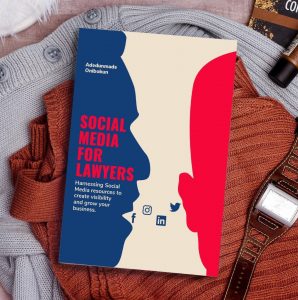
Monday, the 13th of June, 2022 saw the National Information Technology Development Agency release a preview copy of the Code of Practice for Interactive Computer Service Platforms/Internet Intermediaries. According to them, the Draft was created in conjunction with the Nigerian Broadcasting Corporation and the Nigerian Communications Commission. With this draft, they intend to give the general Nigerian populace an opportunity to review and contribute despite the copious absence of a channel for feedback until the 17th of July.
In a recently booming tech ecosystem like Nigeria’s, one which has driven serial international investors and created multiple employment thereby dousing the unemployment inferno to a very large extent, an average citizen is left wondering what the agenda behind this policy could be. This work of the draftsman that could determine their employment status and infringe on their indivisible, inalienable rights simultaneously.
As expected, several knowledgeable and experienced policy experts have publicly expressed their dissatisfaction with this guiding policy document with most pointing out now visibly infamous paragraphs and sections contained therein. This work can be said to be motivated by a huddle call with other colleagues who equally advise these companies and the Nigerian populace who keep themselves happy with content posted on these platforms. Both very worried at the far-reaching legal implications of this draft Code of Practice.
Whilst this article will examine the advantageous parts of this draft, it will not only make a case for the infractions but expose an aspect which goes to the deep root of this intended policy document.
Whither Revenge Porn and Nudity?
Under Part II(2), all Platforms are mandated to inform their users through terms of service not to share content harmful to a child; encourages money laundering, exploiting a child, infringes the subsisting intellectual property of another or promotes terrorism. This seems fair enough in light of the misuse of social media by others who though exercising their fundamental human rights, overreach into the rights of others.
This seems to draw a thick line between where an individual rights stop and where another’s begin. It indeed, is a welcome development.
Platforms were mandated under part IV to delete within 24 hours prohibited materials objectionable on grounds of morality and public interest. This leads us to the age old jurisprudential debate of the line between morality and the law. The Nigerian state as it stands today follows codified law and under no condition shall a person suffer for not written. Nulla poema (crimen) sine lege, the Latin legal maxim which guides the law shows the spirit and nature of the law. In light of the fact that human beings are diverse and the world is dynamic, it is expected that the question of what is moral will be relative.
Are the Platforms expected to gauge what is moral or immoral on behalf of lawmakers and law interpreters?
Can a Platform be held responsible for a crime not known to law?
What exactly is objectionable on grounds of immorality?
In an interview, the Agency’s Legal Services and Board Matters Unit had contended that the inclusion of ‘morality’ is to ensure that whatever goes out is in line with Nigerian local laws. This is rather obscure in nature and evasive.
It is believed that the draft Code of Practice will do better.
Is National Security Greater than Fundamental Human Rights?
The movement for Fundamental Human Rights need no introduction as enough has been said and is continuously being said in order to ensure that the inalienable, indivisible rights of every human being is not taken away from them under any pretext. The Nigerian Constitution, in line with international best practices have adopted fundamental human rights for its citizens and this is seen in Sections 33 through 42 under Chapter IV of the laws of the land.
In Section 37, the Constitution expressly states that the privacy of citizens, their homes, correspondence, telephone conversations, telegraphic communications is protected. Sections 38 through 40 then reiterate that every person shall be entitled to their fundamental rights to freedom of thoughts, conscience and religion; freedom of expression and freedom of association.
All four rights and freedoms are very fundamental to Nigerian Citizens’ usage of these Platforms. There are cases where in exercise of their rights, they also advocate for the continuous protection of those rights. .
In October 2020, Twitter was agog with the EndSars protest which was an advocacy for the protection of the fundamental right to life of every citizen who are prone to police brutality merely by breathing the air in Nigeria. This movement marked a reawakening of conscience and a realization that leaders had to do better. It also put them under a spyglass of scrutiny which they have not been able to avoid till date.
Section 45(1)(a) and (b) however states that where a law reasonably justifiable in a democratic society is enacted in the interest of defense or the public; or for the purpose of protecting the rights and freedoms of other persons, Sections 37 through to Section 41 shall not invalidate such law.
Omnibus Terms: Who is Who? and What is What?
In some paragraphs of this draft Code of Practice, the use of ambiguous words is observed to the extent that upon first instance, one is left wondering whether it is deliberate or a mere oversight on the part of the Draftsman.
The word ‘Child’ in the Definition part is said to be subject to definition by Nigerian Law however it i submitted that Nigerian Law as of today is at variance expressly and by inference as it relates to who a child is. Though the Child Rights Act had been enacted in 2003 by the Federal arm, states like Kano have done a total overhaul with the inputs of Ulamas Islamic Scholars and Society Organizations in order to fit into the Sharia Law acceptable to their state which strictly speaking, they can do in a federal system of government.
The Corporate and Allied Matters Act of 2020 by inference defines a child as any person under 18 by virtue of Section 106. This is also the position of Section 29(4) of the Constitution of the Federal Republic of Nigeria 1999 (as amended). The Definition part should have stated expressly what Nigerian Law will define the age of majority even as some may argue that the Constitution remains the grundnomm, it looks like an area prone to judicial intervention when litigation arises.
Still on ambiguity, Part IV places the liability of removal of ‘prohibited materials’ from Platforms within 24 hours of notice from the government on these Interactive Computer Service Platforms.
The definition of ‘prohibited materials’ is then heavily placed on all applicable Nigerian Laws including but not limited to the eleven stated in the draft namely:
- Nigerian Communications Act;
- National Broadcasting Commission Act;
- Nigeria Broadcasting Code;
- Cybercrimes (Prohibition, Prevention, etc.) 2015;
- Advance Fee Fraud and other Fraud Related Offences Act 2006;
- Nigeria Data Protection Regulation 2019;
- Advertising Practitioners Act 2004;
- Sales Promotions of Nigerian Code of Advertising Practice Sales Promotion and other Right/Restrictions on practice Act 2004.
- Terrorism Prevention Amendment Act 2022 10. NCC Consumer Code of Practice Regulations 2017
- Federal Competition and Consumer Protection Act (FCCPA) 2018.
The effect of which is not only a repetition of these laws but a ticking bomb as a misnomer or misinterpretation of any of these laws may lead to content deletion or even prosecution as it stands. This could also mean that any of these laws may be reviewed from time to time in order to accommodate more ‘prohibited materials’ which is a danger to the constitutionally exhibited right to freedom of speech and right to freedom of thoughts, conscience and religion of every citizen of the country as it were.
What netizens should be thankful for, however, is that it is a draft and it is subject to review. So we are told.
Exercise of Regulatory Powers over Platforms: A threat to Corporate Governance
The nature of these Interactive Computer Service Platforms is quite unique and rather unlike an average company regulated by a regulatory agency or legal frameworks peculiar to its objects. Unlike a construction company or a renewable energy company, these platforms do not stricto sensu, need the license or express permission of any agency in Nigeria to operate as sanctions cannot be used against them effectively. This shall be explained in the next paragraph.
In an instance where a Fintech company is a payment platform, they require a Payment Service Platform license from the Securities and Exchange Commission in order to operate, the default of which will see the Commission see to the closure of such company’s registered address until the needful is done subject to the intervention of the Investment and Securities Tribunal or even the Federal High Court as the case may be.
This shows a degree of control and demonstrable sanctions in a regulatory relationship of suzerainty. This is not the case with Interactive Computer Service Platforms because they do not have bank accounts in the country upon which a lien can be placed or access restricted as in the earlier instance, some do not even have offices in continent while a vast majority of them, if not all, are not incorporated in the country. The nature of Facebook, Twitter, Tiktok, Instagram etcetera is very unique because they are free-to-air.
The draft under part II mandates these multinational Platforms operating globally to carry our risk assessment of every content to determine whether such content is harmful. The practicability of this on a large service platform is quite interesting.
As it stands, even the veil of these companies cannot be lifted in Nigeria to uncover fraud or illegal purposes because they have not made themselves subject to Nigerian Corporate Law and they may choose not to without bearing any sanctions, an example of which is the now infamous Twitter ban which even though was ongoing, Netizens found their way back to enjoy the microblogging platform.
The Corporate and Allied Matters Act of 2020 remains the foremost regulatory framework for the administration of companies in Nigeria as of today alongside Codes of Corporate Governance. This law recognizes and respect that directors, members, persons with significant control should control and administer the company going by the guidelines of regulatory bodies peculiar to their field. It is submitted that regulatory bodies are not supposed to meddle with the day-to-day administration of the company or the object of the company as it goes against corporate governance to have a regulatory agency butt in from time to time on the basis of an ambiguous Code of Practice.
It seems to me that despite claims of the National Information Technology Development Agency that it sought the input of these Platforms, the latter should have, through their policy experts been more involved in the drafting process in order to create an all-inclusive, mutually beneficial and widely accepted policy especially with little degree of control the Agency at present realistically has over them.
An Academic Adventure: The Case for a Punitive Code of Practice
Part VI of this draft Code of Practice explains that non compliance with the Code will be deemed a breach of the National Information Technology Development Agency Act of 2007.
The combined understanding of Section 17 and Section 18 of the Act is to the effect that any person or corporate body who acts at variance with the act commits an offence punishable by fine and imprisonment which does not preclude the payment of levy to the Federal Internal Revenue Service. Asides from the fact that the Act itself does not state where the matter will be heard in the case of a company in default in compliance with the fundamental right to fair hearing entrenched in Section 36 of the Constitution, the nature of Codes generally is that of guidance. Its force in law, I humbly submit, is that which is persuasive in nature.
Codes are not meant to be protocols to an Act of the National Assembly neither are they meant to be punitive by resting on an already existing Act to derive its force of law. That is the difference between an Act and a Code.
In the instance of the Corporate and Allied Matters Act, the Banks and other Financial institutions Act, the Investments and Securities Act and the Central Bank of Nigeria Act ; all acts that regulate Public Companies, you find that such Codes released by by some of the agencies created by these acts are not in nature.
The Code of Corporate Governance for Public Companies released by the Securities and Exchange Commission in 1.3 for instance, states that it is not meant to be a rigid set of rules but to facilitate sound corporate practices.
The Code of Corporate Governance for Banks and Discount Houses in the preamble circular signed by the then Director of Financial Policy and Regulations Department states that it aims to align the Nigerian ecosystem with international best practices.
It seems as though the National Information Technology Development Agency knows that it cannot frontload the provisions of the proposed National Information Technology Development Agency Bill of 2022 through the Code of Practice. Even if that would happen, the new Act should lay the foundation for the new Code and not the other way around. It raises a serious question of law.
Under the 2007 act, the Agency does not have that much power however the fresh bill increase their functions to 24 from 14 thereby overlapping and arrogating other regulatory agencies operating within the same space such as the Computer Professionals Registration Council of Nigeria, Galaxy Backbone, Office of the National Security Adviser, National Universities Commission and so on.
Sections 6, 13, 20, 21 and 22 of the Bill will enable the Agency fix classes of licenses, impose administrative sanctions and enter premises in order to detain persons or companies that contravene the Act.
The classes of lines are: Product License, Service Provider License and Platform Provider License. With the analysis of the proposed Bill, one can easily see that the Code of Practice is intended to announce the appearance as forerunner in anticipation of a more heavily worded and bullish Act.
It is therefore a stellar innovation by the Agency to release a draft Code punitive in nature, ambiguous in wording and that which criminalizes acts not known to law.
 Mosopefoluwa Fayeun is a corporate/commercial lawyer and management consultant with Albert and Abraham LLP where she regularly advises with regards strategy and corporate governance.
Mosopefoluwa Fayeun is a corporate/commercial lawyer and management consultant with Albert and Abraham LLP where she regularly advises with regards strategy and corporate governance.


